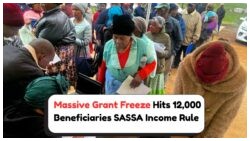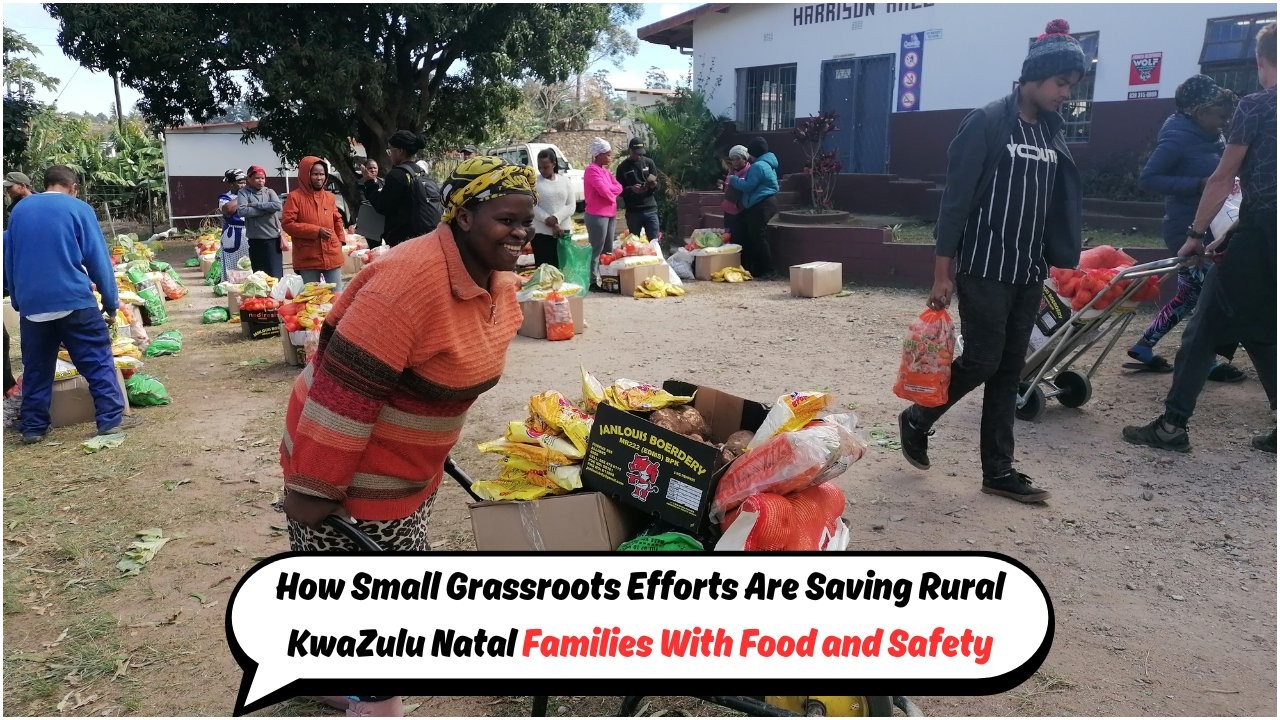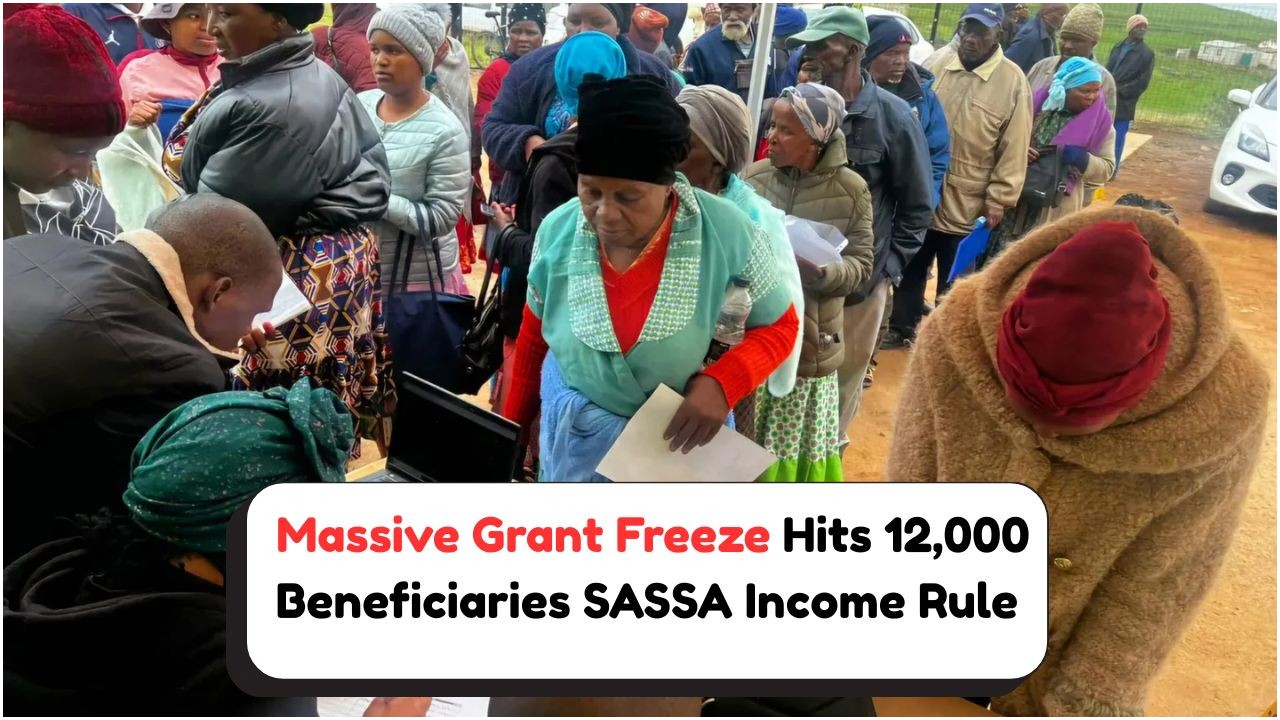Grassroots Hope – In the heart of rural KwaZulu-Natal, where poverty, isolation, and limited access to basic services continue to challenge thousands of families, one community-based initiative is making a meaningful difference. “Action in Isolation” is a grassroots-driven organization that began its work during the COVID-19 pandemic and has since evolved into a life-saving support system for vulnerable households. Their efforts are especially critical in regions where families often struggle to secure food, healthcare, child protection, and social services due to geographic remoteness and economic hardship. Many rural households in KwaZulu-Natal are female-headed, elderly-led, or include orphaned and vulnerable children. Without consistent employment opportunities or government infrastructure in close proximity, families are left to fend for themselves. In such an environment, even accessing basic necessities like clean water, a meal a day, or sanitary products becomes an everyday battle. Action in Isolation recognized this reality early on and designed their programs to meet both urgent needs and long-term development goals. From delivering food parcels to hosting parenting workshops and building child protection networks, their holistic model addresses the multi-layered vulnerabilities faced by rural households. This article explores how Action in Isolation is transforming lives through food relief, safety initiatives, educational outreach, and strategic community partnerships in KwaZulu-Natal.
Food Relief as a Foundation of Survival
To address chronic hunger in KwaZulu-Natal’s rural areas, Action in Isolation places food security at the core of its programming.
- Weekly food parcel distribution to over 1,200 families
- Prioritization of households with children under 12, elderly members, and the disabled
- Nutrition workshops for mothers and caregivers
- Local procurement from small farmers to support the regional economy
- Community gardens established in 10 villages
- Collaboration with food banks and local supermarkets
- Emergency meal kits during natural disasters or health crises
Nutritional Support Initiatives and Impact
The organization tracks the nutritional value and reach of its food programs using local data. Below is a summary of their 2024 outreach.
 Urgent: SASSA Slashes R560–R2,350 Grants for 12,000 People—August Income Verification Critical
Urgent: SASSA Slashes R560–R2,350 Grants for 12,000 People—August Income Verification Critical
| Month | Households Reached | Children Fed | Meals Distributed | Community Gardens | Local Suppliers Engaged | Nutrition Workshops Held |
|---|---|---|---|---|---|---|
| January | 1,100 | 2,850 | 33,000 | 8 | 12 | 6 |
| February | 1,250 | 3,100 | 35,000 | 10 | 15 | 7 |
| March | 1,200 | 2,980 | 34,500 | 10 | 13 | 6 |
| April | 1,350 | 3,250 | 36,800 | 11 | 14 | 8 |
| May | 1,400 | 3,400 | 38,000 | 12 | 15 | 9 |
| June | 1,300 | 3,200 | 37,500 | 12 | 16 | 8 |
| July | 1,450 | 3,600 | 39,000 | 13 | 17 | 10 |
Ensuring Child Safety and Community Protection
Alongside food relief, Action in Isolation emphasizes the importance of safety, especially for children and women in vulnerable households.
- Creation of community watch groups in 14 villages
- Partnership with local police for abuse reporting systems
- Safe shelters for women and children in crisis
- Child protection training sessions for caregivers
- Local hotlines for reporting abuse and neglect
- School-based awareness programs on children’s rights
Safe Spaces and Legal Aid Outreach
Many of these families do not have easy access to legal protection. Action in Isolation works to change that.
| District | Shelters Built | Legal Aid Clinics Conducted | Abuse Reports Handled | Trained Child Ambassadors |
|---|---|---|---|---|
| uThukela | 3 | 6 | 47 | 22 |
| uMzinyathi | 2 | 5 | 35 | 18 |
| Amajuba | 2 | 4 | 29 | 14 |
| Zululand | 1 | 3 | 22 | 12 |
| Harry Gwala | 3 | 6 | 50 | 25 |
Empowering Rural Mothers and Caregivers
To ensure sustainability, Action in Isolation runs education and parenting workshops designed to empower rural caregivers, especially mothers.
- Basic parenting skills and emotional support guidance
- Training on childhood nutrition, hygiene, and mental health
- Peer support groups facilitated by trained volunteers
- Parenting kits with essential items for child care
- Community dialogue sessions for reducing stigma around parenting stress
Women-Led Change and Community Engagement
Women play a leading role in both receiving and facilitating services in their communities.
- Over 70% of community facilitators are local women
- Women-only cooperatives formed for peer income generation
- Skills training offered in sewing, cooking, and care services
- Strong focus on mother-to-mother mentorship systems
Strengthening Local Partnerships and Government Collaboration
To amplify its reach, Action in Isolation works hand-in-hand with local government departments and NGOs.
- Monthly strategy sessions with social development officers
- Joint referrals and case tracking with child welfare agencies
- Hosting integrated community service days with multiple departments
- Providing data on vulnerable households to improve targeting
- Co-funding programs with local municipalities and clinics
Government Departments Actively Involved
These departments play a critical role in sustaining Action in Isolation’s impact.
| Department | Role in Partnership | Contact Information |
|---|---|---|
| Dept. of Social Development | Case management, grants, referrals | 033 264 2064 / [email protected] |
| Dept. of Health | Child immunization, nutrition checks | 033 395 2000 / [email protected] |
| Dept. of Basic Education | School feeding programs, children’s rights education | 033 846 5000 / [email protected] |
| South African Police Service | Safety protocols, abuse investigation | 10111 or nearest local station |
| Local Municipalities | Infrastructure, garden space allocation | Varies per region |
Supporting Children with Special Needs and Disabilities
Action in Isolation recognizes that children with special needs are among the most marginalized in rural communities.
Inclusive Support and Tailored Programs
Their approach includes:
 Eskom Announces August 15 Tariff Hike: Brace for Higher Electricity Bills, Province by Province
Eskom Announces August 15 Tariff Hike: Brace for Higher Electricity Bills, Province by Province
- Identifying children with developmental delays through screenings
- Connecting families to disability grants and special schools
- Providing assistive devices through NGO donations
- Conducting parent support circles focused on disabilities
Expanding the Circle of Care
Through partnerships, they are expanding programs to cover more children in remote areas.
- Mobile clinics with pediatric specialists
- Speech and occupational therapy access points
- Creating inclusive play spaces in rural schools
- Training educators on inclusive classroom strategies
Action in Isolation is more than just a crisis-response organization. It’s a resilient, adaptive, and deeply connected force in the lives of rural KwaZulu-Natal communities. By meeting urgent food and safety needs while building long-term community capacity, it represents a model for rural transformation that places people and relationships at the center of change.
FAQs
1. What is Action in Isolation?
It is a grassroots community initiative focused on food relief, safety, and development for vulnerable families in KwaZulu-Natal.
2. Who are the main beneficiaries?
Mainly rural families with children, elderly individuals, and people living with disabilities.
3. How does Action in Isolation receive funding?
They rely on donations, NGO partnerships, and co-funding from local municipalities.
4. Are the services free of charge?
Yes, all programs and support services are provided free to eligible households.
5. How can someone contact the organization?
Contact can be made via local community offices or through their website (not publicly available here due to privacy constraints).
How does grassroots action benefit rural families in KwaZulu-Natal?
 South Africa's Stage 6 Load Shedding Emergency: Eskom Urgently Seeks Backup to Avert System Collapse
South Africa's Stage 6 Load Shedding Emergency: Eskom Urgently Seeks Backup to Avert System Collapse
By providing food, safety, and care support during isolation.






